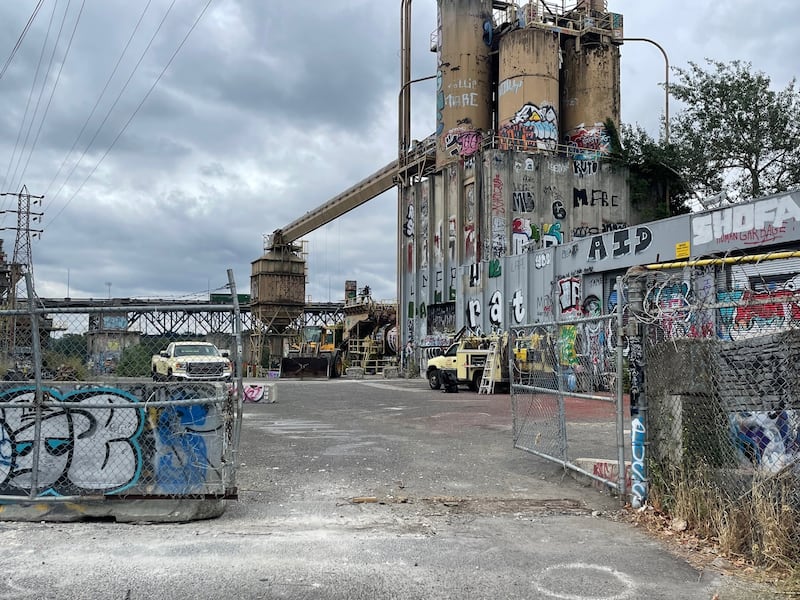A jarring sight greets cyclists, joggers and pedestrians who enter the Springwater Corridor at Southeast 4th Avenue, just south of Ivon Street: a moribund Ross Island Sand & Gravel concrete plant, which has become a prime target for taggers, vandals, metal thieves and others since its closure more than five years ago.
Over the weekend, some cyclists apparently decided they’d had enough. They hung signs (below) on the property’s security gate.
The signs say “Pamplin! Clean Up Your Mess” and “Free Ross Island.” Although it’s unknown who painted them, the signs appear to refer both to the post-industrial clutter at the concrete plant and on nearby Ross Island (where Ross Island Sand & Gravel processed rock for decades and left behind machinery and other waste) and in the Willamette River, which generates algal blooms in the summer in areas affected by the company’s activities.
Whoever placed the signs at the concrete plant did so Aug. 11, which happened to be the day the Providence Bridge Pedal ensured that thousands of cyclists would see them.
(It’s worth noting that Robert Pamplin Jr., the owner and CEO of R.B. Pamplin Corp., which owns Ross Island Sand & Gravel, sold both the concrete plant and Ross Island itself to his company’s pension fund. Those sales were executed at prices—$4.8 million for the concrete plant and $10.8 million for the island—that puzzled real estate pros and struck pension law experts as inappropriate because they saddled pensioners with unused, probably dirty industrial land. Pamplin’s industrial empire, which once landed him on the Forbes list of the wealthiest 400 Americans, has been shrinking. Most recently, he sold 24 Oregon newspapers, including the Portland Tribune.
Pamplin could only effect the real estate transactions because he served an unusual, dual role: He was both the CEO of the company that owned the properties and the trustee of the pension fund that bought them.
That allowed Pamplin to set the prices himself, as he was both seller and buyer. Pension fund regulators frown on such an arrangement as it creates conflicts of interest. They also don’t like pension funds to own fallow industrial land, which produces little income and may carry environmental liabilities.
Pamplin officials have previously said the transactions, along with dozens of others in which Robert Pamplin sold company real estate to the pension fund, are appropriate. However, as WW reported recently, the federal Department of Labor is investigating the pension fund.
Robert Pamplin has been unwilling to discuss his property transactions, and Ross Island Sand & Gravel did not respond to a request for comment today. But somebody is paying attention.
When a reporter visited the concrete plant on the morning of Aug. 12, a day after the Providence Bridge Pedal, the signs were gone, the security gate was open, and two Ross Island Sand & Gravel pickup trucks sat on the property, with evidence of some cleanup around them.

